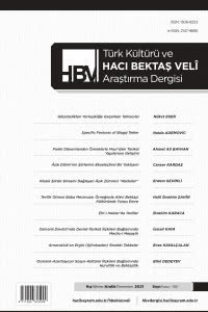AN EXAMINATION OF SUFISM’S RESISTANCE AGAINST THE REGIME IN THE SOVIET PERIOD (1922-1991)
Sovyetler Döneminde Sufiliğin Rejime Karşı Direnişinin İncelenmesi (1922-1991)
___
Bennigsen, Alexandre & Quelquejay, C. Lemercier. (1978). “Muslim Religious Conservatism and Dissent in the USSR”. Religion in Communist Lands 6 (3), 153-161.Bennigsen, Alexandre. (1983) ‘Sufism in the USSR: A Bibliography of Soviet Sources’. Central Asian Survey 2(4), 81-107.
Bennigsen, Alexandre. (1988). “Unrest in the World of Soviet Islam”. Third World Quarterly, 10(2), 770- 786.
Broxup, Marie. (1987). “Islam in Central Asia Since Gorbachev”. Asian Affairs 18(3), 283-293.
Collins, Kathleen. (2003). “To Moscow, not Mecca: The Soviet Campaign Against Islam in Central Asia 1917-1941”. Political Science Quarterly. 118(1), 160- 162.
Froese, Paul. (2005). ““I am an Atheist and a Muslim”: Islam, Communism, and Ideological Competition”. Journal of Church and State. 47(3), 473-501.
Keller, Shoshana. (1992). “Islam in Soviet Central Asia, 1917–1930: Soviet Policy and the Struggle for Control”. Central Asian Survey, 11(1), 25-50.
Kemper, Michael. (2009). “The Soviet Discourse on the Origin and Class Character of Islam, 1923-1933”. Die Welt des Islams. 49(1), 1-48.
Lipovsky, Igor. (1996). “The Awakening of Central Asian Islam”. Middle Eastern Studies, 32(3), 1-21.
Malashenko, Alexei V. (1993). Islam Versus Communism: The Experience of Coexistence. In Eickelman Dale F. (ed.). Russia’s Muslim Frontiers. New Directions in Cross-cultural Analysis. Bloomington: Indian University press
Nurmatov, Zhakhangir. (2019). “Rus Oryantalist Klimoviç’in Kur’an Çerçevesindeki Çalışmaları”. Bilig–Türk Dünyası Sosyal Bilimler Dergisi 89, 193-214.
Tasar, Eren. (2018). “Sufism on the Soviet stage: Holy people and Places in Central Asia’s Socio-Political Landscape after World War II”. Sufism in Central Asia, 256-283.
Quelquejay, C. Lemercier. (1983). “Sufi Brotherhoods in the USSR: A Historical Survey”. Central Asian Survey 2(4), 1-35.
Rahman, Fazlur. (1979). “Evolution of Soviet Policy Toward Muslims in Russia: 1917–1965”. Institute of Muslim Minority Affairs. Journal 1(2), 28-46.
Rakowska‐Harmstone, Teresa. (1983). “Islam and Nationalism: Central Asia and Kazakhstan Under Soviet Rule”. Central Asian Survey 2(2), 7-87.
Ro’i Yaacov & Alon Wainer. (2009). “Muslim Identity and Islamic Practice in PostSoviet Central Asia”. Central Asian Survey 28(3), 303-322.
Sartori, Paolo. (2010). “Towards a History of the Muslims’ Soviet Union: A View from Central Asia”. Die Welt des Islams 50(3/4), 315-334.
Shahrani M. Nazif. (1994). “Islam and the Political Culture of “Scientific atheism” in Post-Soviet Central Asia: Future Predicament”. Islamic Studies 2(3), 139- 159.
Wheeler, Geoffrey. (1977). “Islam and the Soviet Union”. Middle Eastern Studies 13(1), 40-49.
Wimbush, S.Enders. (1984) ‘The Politics of Identity Change in Soviet Central Asia’. Central Asian Survey 3(3), 69-78.
Wimbush, S.Enders. (1985). “Soviet Muslims in the 1980s”. Institute of Muslim Minority Affairs Journal 6(1), 152-166.
- ISSN: 1306-8253
- Yayın Aralığı: 4
- Başlangıç: 1994
- Yayıncı: Ankara Hacı Bayram Veli Üniversitesi Türk Kültürü Açısından Hacı Bektaş-ı Veli Araştırmaları Uygulama ve Araştırma Merkezi
HACI BEKTAŞ DERGÂHINDAN HİMMET UMAN VE MAHLAS ALAN ÂŞIKLARDA HACI BEKTAŞ SEVGİSİ
EMİR ÖMER HAN’IN SULTAN II. MAHMUD’A GÖNDERDİĞİ MUHABBETNAME MECMUASI HAKKINDA
AN EXAMINATION OF SUFISM’S RESISTANCE AGAINST THE REGIME IN THE SOVIET PERIOD (1922-1991)
Turganbai ABDRASSILOV, Zhakhangir NURMATOV, Kainar KALDYBAY
Moğol İstilâsına Dair İki Farklı Aktarım Biçimi: Tarihî Kaynaklar ve Menakıpnameler
MÜSLÜMANLAR NEZDİNDE MEHDİ TASAVVURU: 610-765 YILLARI ARASINDA KÖKEN ve ETKİYE DAİR TESPİTLER
Metin Ziya KÖSE, Mihriban ARTAN
